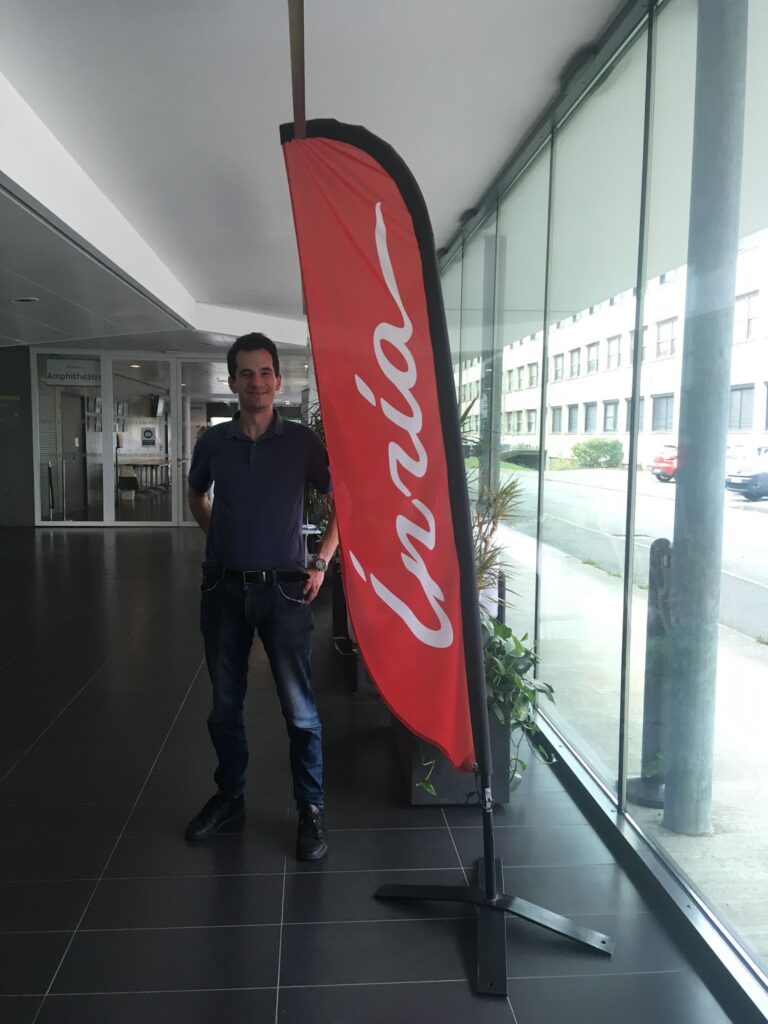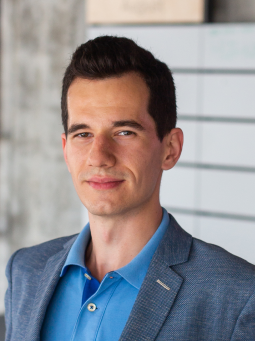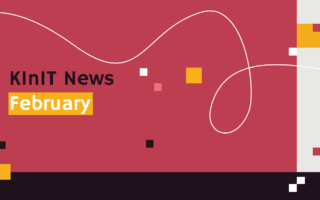What's
A KInIT’s PhD Student Year in Review
We are thrilled to share with you this blog written by our PhD student, Patrik Goldschmidt, who shares his personal view on what it is like to study PhD at KInIT and what surprises and exciting moments his last year brought. For official information regarding PhD studies, check out our doctoral information webpage. We are currently looking for prospective PhD candidates – your journey can start at KInIT!
International Experiences, Personal Growth, and Getting the Research Done
2024. Truly a ride, wasn’t it? I believe we all have something to think about when the previous year’s number is mentioned. Achieving goals, exploring foreign cultures, learning new things, moving forward in our lives… Pause for a while and think about your 2024 highlights for which you are happy, grateful, or proud.
As a part of my regular reflections, I recently asked the same question myself… and came up with really amazing memories. In this blog, I would like to share some of them to tackle a common misconception that a PhD in computer science involves just sitting in front of the screen, reading scientific papers, writing computer code, and running experiments. Truly, it has much more to offer! Traveling, networking, international collaborations, tears and joys regarding research reviews, and warm talks with other PhDs who can motivate you to keep going when you need it the most.
Got off on the right foot
After the 2023 Christmas break, I finally opened my e-mail in early January. Besides some spam, I saw an author notification of the IEEE NOMS 2024 conference, to which we submitted a manuscript in September 2023. And the paper was accepted! It is always a very pleasurable feeling when a committee of experts acknowledges months or years of your hard work. Our paper discussed early detection and mitigation of Distributed Denial of Service (DDoS) attacks via a feature extraction mechanism and machine learning we called Windower (read more).
After some final tweaks, we submitted a final version of the paper, which my co-author Jan Kučera went to present to South Korea in May 2024. Unfortunately, I didn’t manage to present the paper myself, but I’ll definitely make a trip to Korea one day! Therefore, the news of the paper’s acceptance got me very motivated for the rest of the year, but there was more good news to come.
The paper’s co-author, Jan Kučera from CESNET a.l.e., Czechia, while presenting our paper at IEEE NOMS 2024 in Seoul, South Korea.
Writing proposals is tedious – but often worth it!
Towards the end of January, I received another pleasant e-mail. The people from the National Institute for Research in Digital Science and Technology (INRIA) in France responded to my message regarding mutual collaboration. At the end of 2023, I sent several cold e-mails to institutions participating in TAILOR – a Network for trustworthy artificial intelligence. And INRIA was one of them. We agreed to pursue a mutual research project via the TAILOR Connectivity Fund grant scheme, providing funding for research exchanges across TAILOR project labs.
Several e-mails and video calls later, we drafted the project proposal and sent it for review. The review took hellishly long, but the outcome was positive once again! After receiving the acceptance letter for our proposal in April, I booked the airplane tickets and was on my way to France a few weeks later, arriving in mid-May.
Vive la France!
My three-month stay in France was definitely a highlight of the year. Arriving in the Breton capital, Rennes, in the north-west of France, I was ready to get some research done. During my stay, I closely collaborated with INRIA’s team PIRAT, focusing on holistic research of the whole cybersecurity field, including prevention, detection, and reaction to cyber incidents using artificial intelligence. In our joint project, we have explored the transferability of network intrusion detection knowledge in machine learning systems. As each computer network is unique, the knowledge about attacks learnt on one network is not necessarily utilizable for detection models used on different networks. For this reason, investigating what knowledge can be transferred and under what conditions is an important research direction to increase the generalizability, robustness, and performance of network intrusion detection systems.
In close collaboration with two excellent researchers, Yufei Han and Pierre-François Gimenez, we have laid the foundations for a framework for evaluating the similarity (“closeness”) of two data distributions and reasoning on why the knowledge transfer succeeded or failed. At the end of the research, we experimented with domain adaptation techniques like Domain-Adversarial Neural Networks, achieving interesting results such as improving attack detection rates for models that have never seen the particular attack type on a given network before! This is indeed an interesting finding. Hence, we aim to perform more research on the topic and prepare a scientific publication in the upcoming months.
The presentation I gave to the PIRAT team during my stay at INRIA. We discussed my current research and experiences, and I gave a brief talk on the Best practices for ML usage for computer security, as formalized by Arp et al. in 2022.

The last day at INRIA Rennes before my departure. On the one hand, I was happy to see my family and friends again, but on the other, I felt really comfortable there and would stay longer.
However, my three-month stay in France was not only about research. Throughout this time, I visited various cities, tourist sites (e.g., Mont-Saint-Michel), and events across the Brittany region, tasted local cuisine, and even made a few friends here and there. The beginnings were a bit tough since I do not speak the language, but I managed to find my way around and enjoyed my stay very much! If I had a chance, I would surely stay for a bit longer…

A trip to St. Malo with my buddies, who also did an internship at INRIA. Formerly home to fishermen and corsairs, this coastal city in the north of Brittany became a prominent holiday destination with a cosy historical centre, several beaches, and other attractions.
Education and Networking Through Summer Schools
As my research visit concluded in the middle of August 2024, I came back to Slovakia – but not for long! Staying home for 3 nights, I needed to pack my things once again. With the support of the organization BrAIn, I had a chance to participate in yet another fantastic trip – this time to the Netherlands, where the 9th edition of International Cyber Security Summer School (ICSSS’24) took place.
The ICSSS, organized in The Hague by a Dutch cyber security cluster SecurityDelta, is a week-long event for students and young professionals in the field. It focuses on cyber security from various perspectives, including technical, business, and law aspects. As my PhD studies fall under this domain and I am generally interested in cybersecurity, I decided to apply at the start of the year. Amongst hundreds of applications, I was lucky enough to be selected to be one of the 60 participants who could attend the course.
During the school, we attended several lectures from academics and practitioners regarding a multitude of cybersecurity topics like quantum cryptography, supply chain cyber-resilience, investigation of Advanced Persistent Threat actors’ activities, and introduction to the cybersecurity NIS2 directive. We also participated in many interactive activities, such as a cyber security board game or a week-long team project, which our team even managed to win at the end of the school. In addition, we visited Europol headquarters and NATO facilities and had a chance to network at multiple social events. Truly a delightful experience! See my LinkedIn post for the summer school’s summary and key insights.
Photo from our visit to the NATO facilities in The Hague – we were listening to the talk regarding cyber incident response, which was followed by a team activity to solve a practical cyber incident issue.
Once again, the trip to the Netherlands was not only about learning. As I’ve never been to the country before, I went 3 days in advance, and made these days quite busy indeed! The first day, I walked all over Amsterdam until my feet hurt. The second day was dedicated to Delft, a small yet lively historical city with one of the most prestigious technical universities, TU Delft, with around 27,000 students currently enrolled. Throughout the third day, I paid a visit to Rotterdam, a city with modern architecture all over the place – which was quite a contrast to Delft. On the fourth day, the summer school already started. Still, I managed to walk around The Hague a bit in the morning. Overall, I felt I needed much more time to grasp the atmosphere of these amazing places, but given the conditions, I think I did the maximum I could and would definitely like to come back to this beautiful region one day.
Classic scenery from Amsterdam, shown to me by a local guide, Rolf, as a part of a Free Walking Tour around the city.
Life back to normal – my exploits in Slovakia
With the beautiful summer coming to a close, I returned to Slovakia at the end of August to resume my everyday life. But could I just resume it to its previous state after such exciting activities? No way, I couldn’t. My motivation skyrocketed! With renewed vigour, I carried on my work on surveying network intrusion datasets, working diligently for the months to come. Although the work was tedious and sometimes rather repetitive, after more than a year, I finalized the research and finally wrote a scientific paper towards the end of the year. After some checks and revisions, we have finally submitted the paper to the prestigious scientific journal Computers & Security and released a preprint while the paper is being reviewed.
Besides purely focusing on work, as PhD students in KInIT, we also enjoyed several joyful moments together, such as our meetups over a beer or a glass of wine after work. Towards the end of the year, KInIT also held its traditional Christmas party, which definitely heightened the mood of many. Although the life of a PhD student is not simple sometimes, having a great community of people motivates and keeps you afloat during tough times and improves your day-to-day office time, for which I am indeed very grateful.
A photo of the after-work session of KInIT PhD students and interns. We visited three bars that evening and discussed literally everything, from our work activities to politics, economy, health, and even personal matters.
I had a great year – will you join me?
As I mentioned in this blog, I had a really spectacular year. I’m looking forward to what 2025 will bring. PhD is not only about studying your professional topic but also about the connections you make, the experiences you obtain, and your personal development along the path. Considering living your PhD dream as well? We currently have PhD positions open. See our doctoral webpage for more information.


